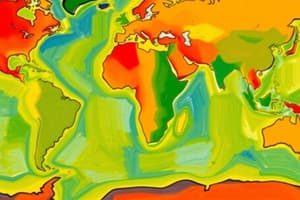Podcast
Questions and Answers
Which of the following best describes Global Positioning Systems (GPS)?
Which of the following best describes Global Positioning Systems (GPS)?
- A method of analyzing climatic changes
- A tool for predictive data analysis
- A technology for determining precise locations on Earth (correct)
- A system used for social interactions
Human-Environment Interactions only study how the environment impacts human society.
Human-Environment Interactions only study how the environment impacts human society.
False (B)
Name one key skill in geography that involves understanding relationships between different locations.
Name one key skill in geography that involves understanding relationships between different locations.
Spatial reasoning
The increasing interconnectedness of the world is known as _________.
The increasing interconnectedness of the world is known as _________.
Match the following geographic skills with their descriptions:
Match the following geographic skills with their descriptions:
Which branch of geography focuses on the Earth's natural features and processes?
Which branch of geography focuses on the Earth's natural features and processes?
Human geography examines the interactions between human activities and the Earth's natural processes.
Human geography examines the interactions between human activities and the Earth's natural processes.
What is the science and art of map making called?
What is the science and art of map making called?
The arrangement of features across the Earth's surface is known as ______.
The arrangement of features across the Earth's surface is known as ______.
Which of the following is NOT a component of human geography?
Which of the following is NOT a component of human geography?
What does the concept of sustainability in geography refer to?
What does the concept of sustainability in geography refer to?
Define 'Region' in geography.
Define 'Region' in geography.
Flashcards
What is Geography?
What is Geography?
The study of the Earth's surface, including its physical features, climate, inhabitants, and the interactions between them.
What is Human Geography?
What is Human Geography?
Examines how human activities shape the Earth's surface and vice-versa.
What is Physical Geography?
What is Physical Geography?
Explores the Earth's natural processes and systems, such as climate, landforms, and ecosystems.
What is Spatial Distribution?
What is Spatial Distribution?
Signup and view all the flashcards
What is a Place?
What is a Place?
Signup and view all the flashcards
What is a Region?
What is a Region?
Signup and view all the flashcards
What is Scale?
What is Scale?
Signup and view all the flashcards
What is Interaction?
What is Interaction?
Signup and view all the flashcards
Human-Environment Interactions
Human-Environment Interactions
Signup and view all the flashcards
Spatial Interaction
Spatial Interaction
Signup and view all the flashcards
Regions and Regionalization
Regions and Regionalization
Signup and view all the flashcards
Globalization
Globalization
Signup and view all the flashcards
Sustainability and Environmental Issues
Sustainability and Environmental Issues
Signup and view all the flashcards
Study Notes
Introduction to Geography
- Geography is the study of Earth's surface, including features, climate, inhabitants, and their interactions.
- It encompasses human and physical geography.
- Human geography explores how human actions shape Earth's surface, and vice-versa.
- Physical geography examines Earth's natural systems (climate, landforms, ecosystems).
Branches of Geography
- Physical Geography:
- Focuses on the Earth's natural features and processes.
- Includes biogeography (organism distribution), geomorphology (landforms), hydrology (water resources), climatology (climate), and soil geography.
- Human Geography:
- Studies human activities and their spatial patterns.
- Includes population geography, economic geography, cultural geography, urban geography, and political geography.
- Regional Geography:
- Analyses specific world areas, evaluating their unique characteristics and processes.
- Combines physical and human geography to perceive interconnectedness of human and natural systems.
- Cartography:
- The science and art of map-making.
- Vital for displaying geographic data and examining spatial relationships.
Key Concepts in Geography
- Spatial Distribution: Arrangement of features across Earth's surface.
- Place: Specific location with unique characteristics.
- Region: Area with shared characteristics.
- Scale: Level of detail in geographic study (global, national, local).
- Interaction: How parts of Earth's systems affect one another.
- Movement: Flow of people, goods, ideas, and information across space.
- Location: Position on Earth's surface (absolute, relative).
- Environment: All living and non-living things and their interactions on Earth.
- Sustainability: Maintaining a system without depleting resources or degrading the environment.
Geographic Tools
- Maps: Visual representation of geographic information.
- Remote Sensing: Using satellite and aerial imagery for data collection.
- Geographic Information Systems (GIS): Software to manage, analyze, and manipulate geographic data.
- Global Positioning Systems (GPS): Precise location determination on Earth.
Key Themes in Geography
- Human-Environment Interactions: How human activities affect the environment and vice versa.
- Spatial Interaction: Connections between people, places, and processes.
- Regions and Regionalization: Identifying areas with shared characteristics.
- Globalization: Increasing interconnectedness of the world.
- Sustainability and Environmental Issues: Addressing resource management, pollution, and climate change.
Geographic Skills
- Critical thinking: Analyzing geographic information and forming opinions.
- Spatial reasoning: Understanding relationships between locations.
- Map interpretation: Identifying patterns, relationships, distribution, and trends on maps.
- Problem-solving: Applying geographic knowledge to address issues.
- Data analysis: Using information to infer and conclude about geographic phenomena.
- Communication: Presenting geographic ideas to audiences.
Studying That Suits You
Use AI to generate personalized quizzes and flashcards to suit your learning preferences.




